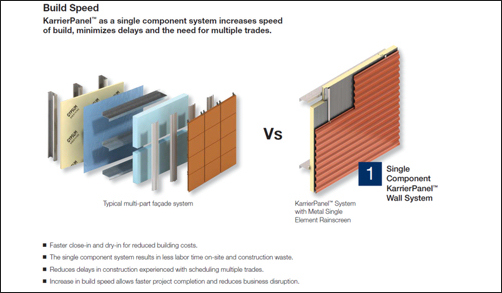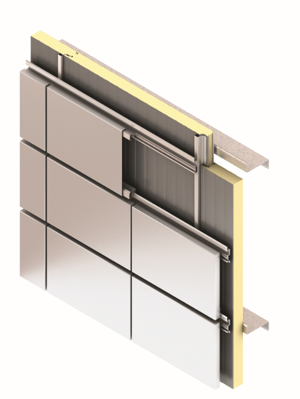 By Brad Kirkland, CSI, Kingspan Insulated Panels
By Brad Kirkland, CSI, Kingspan Insulated Panels
As you look to construct a brand new building for your business, you browse the Internet for a few options, only to end up more confused than when you started. Choosing between brick and aluminum cladding systems isn’t such a tough decision, but there are some companies offering single component wall systems, while others tout the built-up. Which way do you go? Does it matter? Why? With a soothing breath, take a minute as you will soon discover why single component wall systems trump built-up systems and everything else will fall into place.
| |  |
| | The infographic above illustrates the simplicity of the single-component approach — and inherent benefits — utilizing the KarrierPanel™ system by Kingspan Insulated Panels as an example. Other companies offer their own variations on the single-component cladding concept, with proprietary differences. Click to enlarge. |
When it comes to business, what matters most is the bottom line. And if you are spending all of it before the doors open, then you are in considerably big trouble. When every dollar counts, your money should be invested in single component wall systems. With a single component system, everything is manufactured off-site. That way, when it arrives at your building location, the end product is ready to be installed, saving you time and money. A single component system also eliminates the need of multiple trades, eliminating the potential for work delays, thus reducing labor costs.
Go with a built-up system and your concern will shift to wondering where the materials needed to construct your wall originate. Do they have to utilize your woodlot? Do they have to depend on the inventory of a local lumberyard? There are a variety of external factors that are less beneficial and only leave openings for more delays.
 | |
Shown above is Kingspan's KarrierPanel™ single-component wall system featuring Benchmark panels as a cladding. | |
Another reason single component wall systems are a win for any business is quality control. You have one company making your wall or roof system in a controlled factory environment. With built-up systems, you are now highly dependent on the on-site workmanship. It leaves the project vulnerable to skill, personal emotions on a day-to-day basis, weather and multiple uncontrollable factors. The fact that single component systems are built off-site is also beneficial because less workers are needed, which additionally reduces the chances for error in addition to labor costs.
When workmanship quality is an issue, equally concerning is the damage that can occur while the built-up systems are in the process of being installed … even if no tools are involved. While single component systems can be completed in days, built-up systems may take weeks. So what is happening during this time? Not only is the floor exposed to the mercy of the elements, but any building materials that are left on-site are vulnerable as well. You can only hope the materials are properly secured and shielded. If not, the materials are at risk of moisture … or directly getting wet, both of which can lead to an invasion of mold, and who wants to kick their newly constructed building off with a major issue?
Single component wall systems also offer much more when it comes to sustainability. With tested R-values of 7.5 per inch and a thermal envelope reducing the thermal bridging, the single component system really wins when it comes to energy efficiency. Built-up systems often have to jump through hoops to try and increase their energy efficiency. For example, insulated concrete forms are used to provide a high level of energy efficiency in some built-up systems. The downfall is it will eat up a more than generous amount of square footage compared to simply utilizing a single component wall system.
Lastly, when it comes to design options, the most flexible option comes with the implementation of single component systems. Vertical or horizontal applications, unlimited cladding options, and the aesthetic appeal of endless color choices are what you can expect with single component wall systems. If you want a building design that stands out in a sea of competition, then this is the way to go.
At the end of the day, the choice should be quite clear. Single component wall systems will save you time and money by being built off-site. They provide consistency in craftsmanship, give you high-energy efficiency without sacrificing square footage, and have the most flexible design. Single component wall systems are everything you need to create the building of your dreams, and they easily trump the many layers of a built-up system.